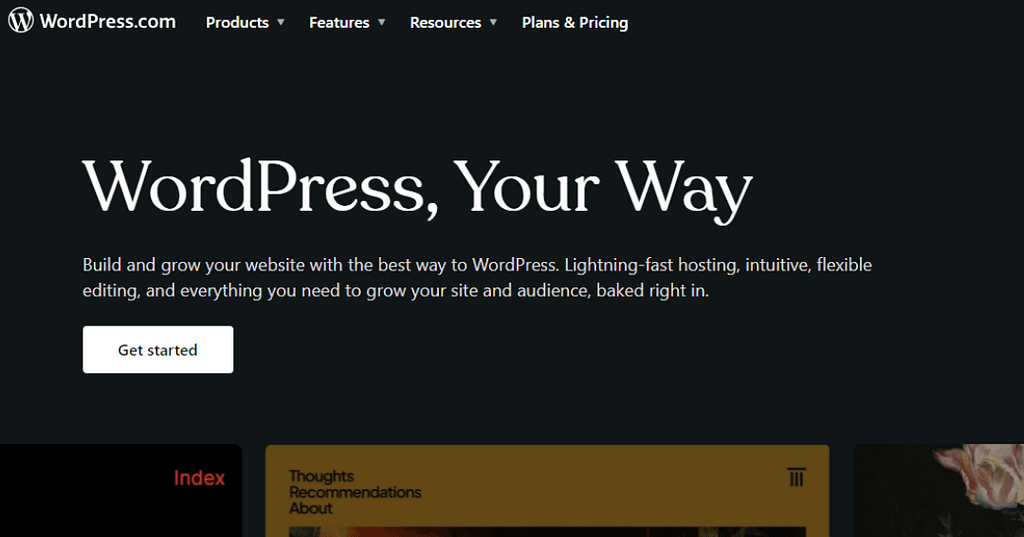
Do you want a website with the minimum problem of hosting? Look no further. Today we will consider if a website can be done in WordPress but without hosting.
Can you use WordPress without hosting? I occasionally get messages from my clients Can You Build a Website with WordPress Without Hosting? The answer is Yes.
Understanding WordPress and Hosting
WordPress
WordPress is a well-known content management system (CMS) that works as a blog-publishing application or blogging platform. It has been researched that 40% of the web is covered by WordPress and there are many reasons behind it.
WordPress made it simpler for all of us to construct websites and design them from scratch even if we don’t know coding language.
Hosting
For the most part, you have to have hosting to save your tree stumps someplace and to make your site stay real online. But there are ways to have WordPress without hosting, enabling a foundation for anyone who wants to simplify website construction by choice alike.
How to remove unused CSS in WordPress?
Creating a Website Without Hosting
1. Choose a Platform:
WordPress. com: Free Plan offers basic features while Paid Plan provides advanced customization options.
Third-party services: Some services offer auto-install for WordPress and management of a WordPress blog without traditional hosting.
2. Sign Up/Create an Account:
WordPress. com: Go to WordPress. com and create an account
Third-Party Services: Create an account on the platform of your choosing.
3. Select a Domain:
WordPress. com: Select a Free Subdomain (e. wordpress. com) area or a customized space(/^\w+.
Exercise for third-party services: follow the domain setup process from the service.
4. Customize Your Website:
Find a WordPress theme that suits what you will be using your website for and see if it works with your brand.
Customize the look of the theme by uploading your brand, and changing the colors, font, and whatnot.
5. Add Content:
Some examples of pages are Home, About, Contact, etc., and you can create posts for your website.
You have the ability to add text, images, videos, and any other multimedia content to your pages and posts.
6. Install Plugins (Optional):
WordPress. com: Some Paid Plans Restricted plugins
Third-Party Services:- Have a look if the service supports plugin installation, and use the plugins for an extra feature.
7. Configure Settings:
Configure your permalinks, privacy settings, and all other configurations securely as you like.
8. Preview and Test:
Before you finish your work, take a look at your website and check if everything is styled and working correctly.
You should test different devices and different browsers, to check the compatibility of the website.
9. Publish Your Website:
After you are happy with your website, publish it and make it available to internet users.
Let the world know your website URL
10. Maintenance and Updates:
Always keep your WordPress core, WordPress theme, and WordPress plugin updated to stay secure and functional.
Track the performance of your site and make adjustments where necessary if you are not happy with how it presents itself to users.
11. Additional Considerations:
A hosting free website setup is fine, but it can be limiting compared to WordPress self-hosted websites.
When you are looking for a hosting solution for your website think about your long-term goals and scalability needs.
Which are the best free eCommerce website builders?
For those who wonder how to build up an eCommerce web page without hosting, the use of a free eCommerce CMS such as WooCommerce would be the answer for designers.
WooCommerce is known to be the perfect solution for its user-friendly nature as well as being customizable which is why it is enjoyed by many designers who want to build a store with few hosting requirements.
How will I know a site is using Dynamic Rendering?
Dynamic rendering involves serving various versions of your website based on the user’s device or browser. If you want to know whether any given website is using dynamic rendering, you will need to take a look at its source code and search the website for JavaScript or any other type of dynamic element that would modify the site content in response to how the user interacts with it.
Conclusion
In conclusion, while traditional hosting is often necessary for website creation, there are alternatives available for those looking to build a website without hosting.
Whether using WordPress.com or static site generators, designers and website creators can explore options that suit their needs without compromising on functionality.